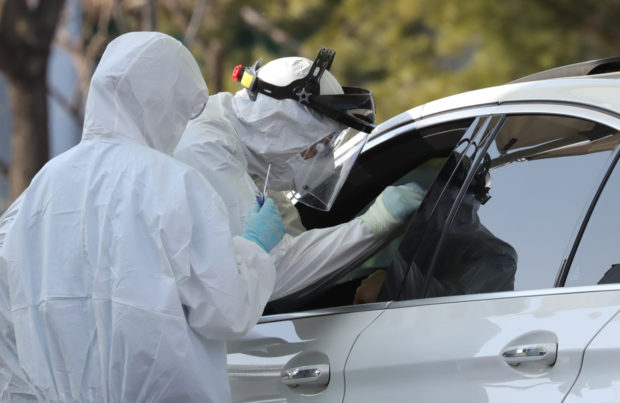New infections drop, but Seoul on alert for new clusters
SEOUL — South Korean government said the country might see a slowing trend in the spread of the novel coronavirus as it reported 367 new cases of coronavirus infections Sunday, the lowest daily increase in more than 10 days.
Health authorities, however, were cautious about the slowing trend, saying it was too early to say the situation has got better and new clusters of infections could still emerge.
The total reported cases here stood at 7,313 on Sunday afternoon — with 179 more cases since midnight Saturday — according to the Korea Centers for Disease Prevention and Control. Fifty people have died from the virus.
The government will open 10 community quarantine centers to accommodate 2,500 patients with no or minor symptoms, Health and Welfare Minister Park Neung-hoo said at a briefing Sunday, and expand the testing capacity to run up to 17,000 tests.
Nearly 80 percent of local coronavirus cases are classified as cluster infection cases, while 20.6 percent are sporadic with their exact infection routes being scrutinized, health authorities said Sunday.
Article continues after this advertisementIt was belatedly made public on Saturday by the Daegu Metropolitan Government that 46 cases had been confirmed at an apartment block in the city.
Article continues after this advertisementAnother cluster of infections was reported Friday, with a total of 13 people confirmed to be infected with COVID-19 at Bundang Jesaeng Hospital in Seongnam, Gyeonggi Province. An epidemiological study to identify the infection route is underway.
The majority of the new cases on Sunday were confirmed in the southeastern city of Daegu and the neighboring North Gyeongsang Province.
“Daily new cases decreased slightly,” said Jung Eun-kyeong, director of the Korea Centers for Disease Control, adding that this was because the widespread virus testing on the followers of Shincheonji Church of Jesus was coming to an end.
“In other cities and provinces, cases occur at certain hospitals or social welfare facilities. But we don’t see increases as dramatic as in Daegu and North Gyeongsang Province,” she said, adding there could be small-scale transmissions.
Some 297 cases were confirmed in Daegu and 32 in North Gyeongsang Province — accounting for 90 percent of the new cases, according to data tallied at Saturday midnight by the KCDC.
Twelve new cases were reported in Seoul, 11 in Gyeonggi Province, six in South Chungcheong Province and 4 in North Chungcheong Province.
So far, 50 people, mostly those who are in their 50s or older with underlying illnesses, have died from COVID-19, with the overall fatality rate at 0.7 percent. The death rate stands at 4.4 percent for those in their 70s and 6.6 percent for those in their 80s.
A total of 36 people were in critical condition, according to the KCDC.
A total of 7,134 people were in quarantine, while 130 people were released from quarantine after making full recoveries on Sunday.
The number of people being tested for the virus stood at 19,376. The country has so far tested a total of 181,384 people, with 162,008 testing negative as of Saturday midnight.
Daegu Mayor Kwon Young-jin said at a briefing Sunday that he would file complaints against members of the Shincheonji church’s Daegu branch who fail to get tested by the afternoon, out of 140 residents, 46 people tested positive, all of whom are followers of the Shincheonji Church of Jesus. Eighty people tested negative and 14 were awaiting their rest result.
Some 64 percent of the confirmed cases in Korea are linked to a branch of the Shincheonji church in Daegu — the largest cluster of infections in Korea.
Among 8,269 Shincheonji members secured by the municipality, 91 people have refused to take the virus test and 23 of them remain out of reach, Kwon said.
A follower of the Shincheonji tested positive, the Gwangju Metropolitan Government said Sunday, after two weeks of self-isolation, triggering concerns that the incubation period for COVID-19.
The 22-year-old patient, living in Gwangju, was released from self-quarantine on Feb. 2, but tested positive Saturday.
Meanwhile, a pregnant woman, who was infected with the virus, gave birth to a baby in Daegu. The baby tested negative, according to the KCDC
In the wake of a shortage of masks, the government’s measures to stabilize the supply of masks come into force starting Monday.
Under the new numbered system, Koreans can buy two state-supplied masks per week from pharmacies based on the year of birth with valid identification cards. Those born in years ending one and six are able to buy masks on Monday, for example. Those who do not make purchases on a weekday will be allowed to buy masks on the weekend.
Foreigners can buy masks too with their foreigner registration card, but they also need their health insurance certificate.
Amid coronavirus fears, some 103 countries and regions are imposing travel warnings on Korea, entry bans or toughened quarantine procedures on visitors from here.
For more news about the novel coronavirus click here.
What you need to know about Coronavirus.
For more information on COVID-19, call the DOH Hotline: (02) 86517800 local 1149/1150.
The Inquirer Foundation supports our healthcare frontliners and is still accepting cash donations to be deposited at Banco de Oro (BDO) current account #007960018860 or donate through PayMaya using this link.
